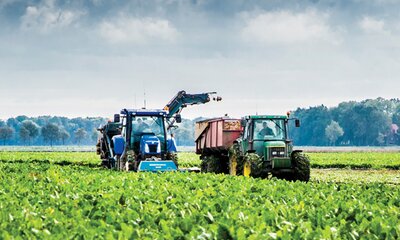Future of the protein transition in ESG reports
The introduction of the Corporate Sustainability Reporting Directive (CSRD) and the associated reporting standard (European Sustainability Reporting Standards, ESRS) will shake up the sustainability field considerably. Although the standardized approach contributes to more consistency and comparability, it could lead to important topics such as the protein transition receiving less attention in sustainability reports from companies in the food chain.
The potential impact of the CSRD on the protein transition
The CSRD requires companies to determine which sustainability issues are relevant to them by means of a double materiality analysis. The protein transition is not a 'standard' topic within the ESRS. Companies do have the option of including social themes that they can impact as a company as a company-specific topic in their reports. Concrete goals and actions from companies are essential to accelerate the protein transition and to maintain attention for the subject.
Analysis of the protein transition in the retail sector
Retail plays an important role in what people eat on a daily basis. But what are their objectives regarding the protein transition and how much plant-based protein do they currently sell?
In 2023, Dutch supermarkets sold an average of 39.6% plant-based proteins within the group of proteins sold (based on the Eiweet method). Progress is visible at the three companies that reported on this as early as 2022. A comparison of the sustainability reports from 2022 and 2023 shows that the protein transition has gained in importance in recent years. Five out of six supermarket chains now cover the subject in greater depth and detail than before. The fact that a large number of companies have switched to a double materiality analysis, as required by the CSRD, has not changed this.
All retailers have clear, ambitious targets for 2030 that exceed the government's target of 50% plant-based proteins, with the exception of Aldi Netherlands. Jumbo and Lidl have even recently increased their targets from 50% to 60% of plant-based proteins sold.
Protein transition integrated into Dutch retailers' sustainability policy
The protein transition is often discussed in sustainability reports under broader sustainability themes, such as 'healthy products', 'climate protection' or 'emission reduction'. This indicates that the protein transition is embedded in the sustainability strategy of companies, even if it is not explicitly presented as an independent main theme everywhere.
The ESRS is a guiding framework for large retailers in the Netherlands based on the double materiality analysis. The implementation of the CSRD is not likely to change the attention paid to the protein transition. It remains an essential theme due to its impact on sustainability issues such as the climate, animal welfare and public health. Many retailers have already integrated the subject into broader sustainability themes and are setting ambitious goals. It is essential that other parties in the food chain also prioritize the protein transition, such as out-of-home and hospitality. Only together can we achieve the goal of at least 50% vegetable proteins.
Need help with ESG reports? Contact Carla Kivits.











